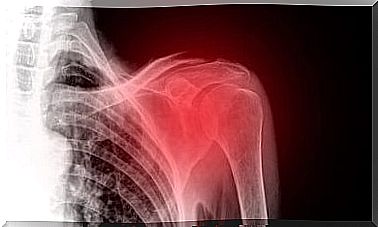How To Deal With Hypothyroidism: 4 Tips
Hypothyroidism can reduce a person’s quality of life. Fortunately, practicing some healthy habits can help you overcome it better. Find out in this article!

Managing hypothyroidism is possible with a little patience and by following all the indications of the endocrinologist. It is nevertheless important to take into account the importance of certain associated factors which can even be dangerous.
Even though, in its initial stages, hypothyroidism can be asymptomatic, the disorder it produces on the hormonal level usually leads to problems like being overweight, joint pain, infertility or heart disease, among others.
This therefore means that it will be essential to make some lifestyle changes. Let’s dig deeper into this topic.
4 tips for managing hypothyroidism
Decreased production of thyroid hormones interferes with the normal balance of chemical reactions in the body. As a result, patients with hypothyroidism tend to gain weight and experience symptoms such as prolonged fatigue, palpitations, depression, constipation, or a constant feeling of cold.
Currently, treatment with synthetic thyroid hormones can safely and effectively manage hypothyroidism. However, to complement its effects, it is worth practicing a few healthy habits that can help control its symptoms.
Take note !
1. Increase iodine intake

Iodine deficiency is one of the factors that affect the development of hypothyroidism, according to this study by Dr. Chung. One of the recommendations to manage this disorder is therefore to increase its consumption through natural sources such as chard, radishes, seaweed, cereals or fish.
It should be taken into account, however, that if hypothyroidism is not caused by iodine deficiency, increasing its intake may be unnecessary. In fact, taking excess iodine supplements could further impair the function of the thyroid gland, making it difficult to treat this imbalance.
Therefore, before proceeding with a dietary modification, it is essential to consult an endocrine.
2. Maintain a balanced diet
One of the consequences of this disease is weight gain. Changing past habits with a healthy diet developed by the endocrine will allow adequate absorption of nutrients and promote metabolic functions to control body weight.
A balanced diet should contain the following:
- Sources of fiber, such as whole grains, dried fruits, seeds, fruits and vegetables.
- Foods high in lean protein, such as chicken, turkey, fish, etc.
- Some water.
- Healthy fats, such as those provided by olive oil, avocado or oily fish, among others.
In addition, we must eliminate from the diet anything that can be harmful, both for the thyroid and to have a healthy weight. This includes refined sugars and flours, saturated and trans fats, hydrogenated oils, etc.
3. Speak with a psychologist
Due to the alterations that occur in the hypothalamic-pituitary-thyroid axis and in the neurotransmitter system, depression can be one of the symptoms of hypothyroidism.
It is therefore recommended to consult a psychologist. Taking care of your mental health is very important, especially when a chronic illness kicks in.
4. Exercise to manage hypothyroidism
Regular exercise is indicated to manage hypothyroidism and its health effects.
If it does not replace hormonal therapy, it can nevertheless derive specific additional benefits, especially on weight and cardiovascular health, as confirmed by this study carried out by a team from the Shri Ram Murti Smarak Institude of Medical Sciences (India ).
Moderate workouts reduce the risk of heart disease. They also help control symptoms related to weight gain, fatigue and joint pain.
The most important thing is however to adapt the routine to the physical capacities of each one. This is why the practice of these activities must be done gradually.

Do not abandon
Hypothyroidism is a disorder that causes the body’s functions to deregulate. So, to prevent it from affecting the quality of life, it is important to seek adequate medical treatment and improve the lifestyle.
It is also recommended to speak with a psychologist. You shouldn’t let illness affect your mood. You are strong and you will be able to fight this disease: you only need a little more help.









